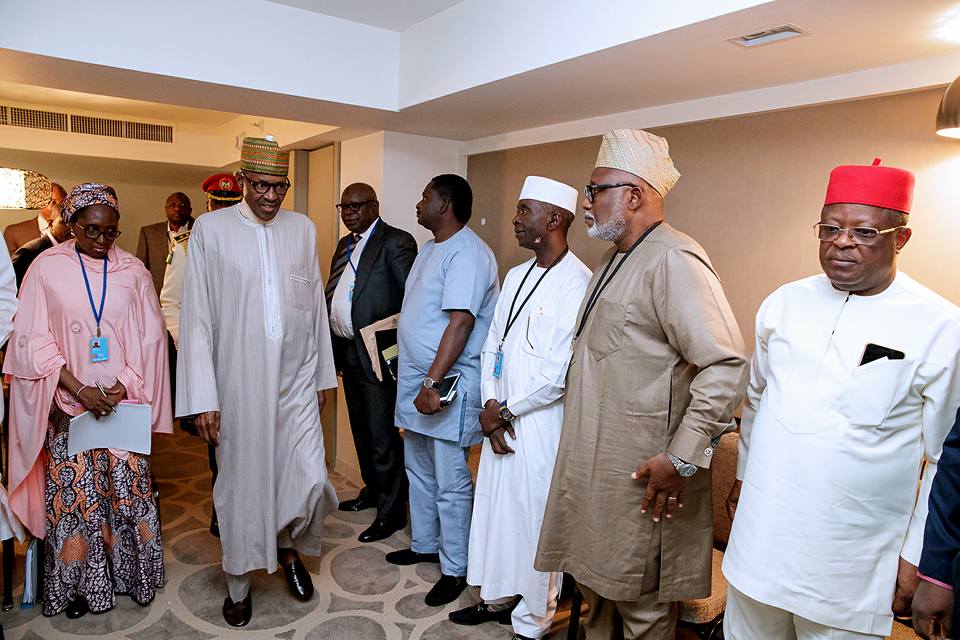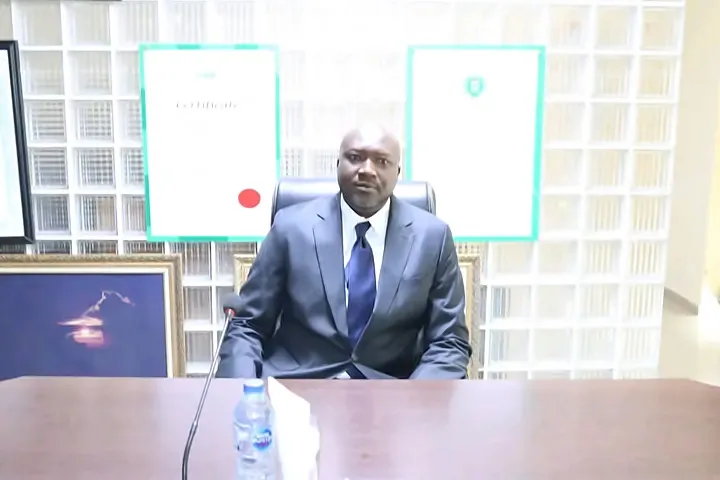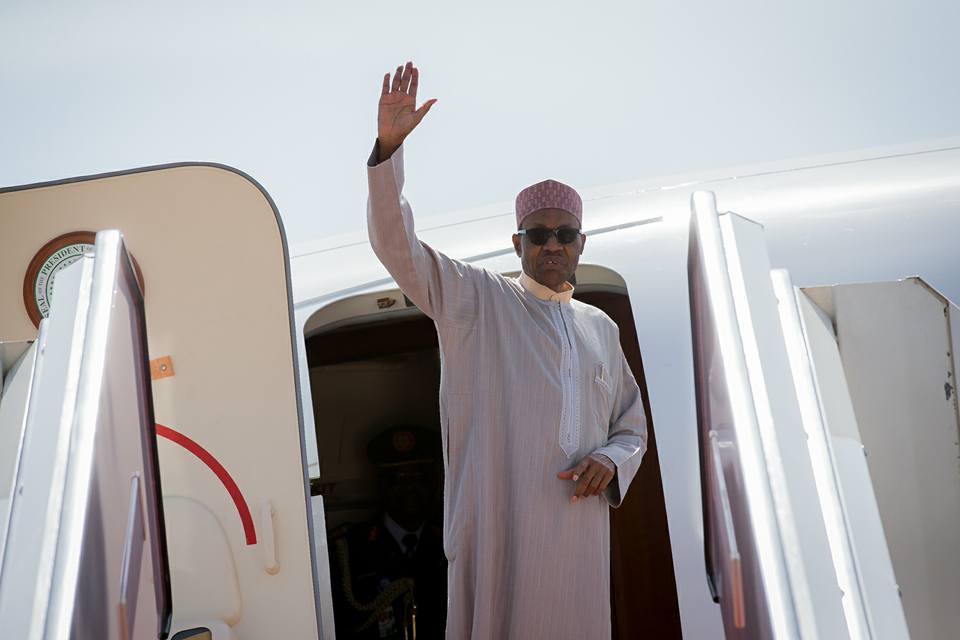General
72nd UNGA: Presidency Says Fake Buhari Speech in Circulation

By Dipo Olowookere
The presidency alerted Nigerians of a speech purportedly delivered by President Muhammadu Buhari at the ongoing United Nations General Assembly (UNGA) in the United States of Amercia (USA).
In a tweet early Tuesday, the presidency said on Twitter that Nigerians should disregard the said post advising the UN on the need to restructure the global body.
“There’s a fake speech circulating online as the text of President @MBuhari’s #UNGA Address, to be delivered Tuesday. Please DISREGARD it,” the post from the verified Twitter account @NGRPresident (Presidency Nigeria), said.
President Buhari is among the leaders to speak at the UN General Assembly today.
This year’s debate theme is ‘Focusing on People: Striving for Peace and a Decent Life for All on a Sustainable Planet.’
Below is the fake Mr Buhari’s speech:
The president of the United Nation’s General Assembly,
Your Excellencies,
Heads of States and governments,
Distinguished Delegates,
Ladies and Gentlemen.
On behalf of the government and people of the Federal Republic of Nigeria, I congratulate you, Mr President, on your election to preside over the 72nd session of the United Nations’ General Assembly.
I also wish to express my country’s appreciation to the Secretary General of the United Nations, Mr Antonio Guterres, for his steady leadership and this body’s dedication to the search for a peaceful and equitable world through the charter of the United Nations.
Every year, we gather here to deliberate on the affairs of the world. Sometimes we implement what we talked about and move humanity an inch closer to that ideal relationship as members of the world community.
At other times, we have our talks and end up not implementing anything to the disappointment of millions and millions of people around the world who look up to this body to provide leadership in a world that is constantly oscillating between advancement and doom.
In all of these, we often forget that what we have accomplished in the last 72 years is unprecedented in the annals of human history.
The world may be badly governed, but the fact that there is a form of governance agreed upon by all is an accomplishment in and of itself.
So, I congratulate us all. Mr President, as we say in Nigeria, he who does not look ahead remains behind. Our charge now is to aspire to make this world better for the next generation. We, the generation that knows how the world was before the United Nations was formed, must bequeath to those coming behind us a better United Nations that would be in a position to deal with the challenges of tomorrow.
To accomplish that, we need to fast forward the reformation long proposed in this chamber. To restructure or not to restructure is no longer the question – the United Nations must be restructured for it to remain relevant in years to come. How to restructure the United Nations should be our priority number one.
Several ideas are out there. All that we need is to get them together and agree on what works for majority of the people of this world.
As a leader of one of the leading African nations, I want to see a United Nation’s Security Council that is expanded to have one or two African permanent members with veto powers. It is a fair thing to do – one that will benefit the world by giving it a chance for a more balanced outlook to matters of importance to us all.
As we have learned in Nigeria, sometimes you need to change in order to remain the same. It is the first principle of renewal. In the continent of Africa, the post-colonial era is going into a new phase. In another generation, there would not be any African alive who could remember when European powers once governed Africa.
That emerging generation is creating new challenges for the African order left behind by the colonial powers. My generation is managing that challenge with the hope of leaving behind nation states that are less prone to crisis. We cannot continue to pretend that conflicts that emerged as a result of our colonial heritage have been resolved.
Across our continent, they are still there. In some cases, bad governance is exacerbating these conflict points. Here are some of the things we are doing to make sure that we bequeath to the upcoming generations of Africans a continent that is healthy, wealthy and well-grounded in law and order.
We are close to enshrining in the African Union’s creed the fundamental principle of democracy, which says that a credible people’s mandate should determine who governs any nation across Africa. We are taking it a step further by pushing to make that mandate limited.
We believe that Africa has numerous talents and no man or woman should be in the leadership saddle for an inordinate time. We are also working hard to expand the African market and open it up for our people to benefit from the free flow of goods, services and knowledge across the continent. It is the only path to prosperity for over one billion people in Africa yearning for opportunities to show the world the potentials they have.
As Africans, we will continue to build partnerships across the world. As we stretch our hands out for friendship, we do so with the expectation that our hands would be met not with pity and charity but with respect and dignity. Africans have a lot to offer the world, not just its minerals and human potentials. We are committed to resetting that old perception with a new one that proclaims Africa as a land ready for business.
Those who have taken the steps to invest in Africa can attest to the mutual benefit that comes with it. In areas of infrastructural developments, research and security, we urgently need a respectable and mutually beneficial partnership with the world. Integration of the continent and expansion of prosperity can only come when there are good roads, constant electricity, clean water and descent healthcare for our people.
The United States government, The European Union, private investors and non-governmental organizations are getting involved in these ventures.
Africa will continue to welcome the world in every enterprise that will uplift our people. It is only when we add value and build capital that we will reduce the grim statistics of Africa’s child mortality rate from preventable deaths.
It is only then that we can reduce deaths on the Mediterranean Sea of African youths running away from conflicts and poverty. The challenge is ours. We accept the responsibility. As in the past, we know that we do well when we share skills and expertise. That was how we were able to work together with partners around the world to reduce the AIDS epidemic. That was how, in the last two decades, we were able to defeat diseases like polio, tuberculosis and ringworm in several parts of Africa. Africans have always been appreciative of the assistance we receive.
We have also paid back to the international community with our involvement in Peace Keeping missions across the world. Mr President, on matters of security, there is no gainsaying that when one part of the globe is insecure, all parts of the globe become potential victims of that insecurity. The activities of several extreme groups jeopardize not just the nation where they emanated but everyone far and in-between.
The free movement of fighters and weapons has all but made the issue of security a global problem. As we have learned in Nigeria, you compromise the security of the whole when components of the sum are not fully valued, appreciated and integrated with the whole.
We in Africa have been partners in the quest for a secure world. We will continue to be committed to the mission until all threats to peace across the world are eliminated. In Nigeria, we have degraded the capability of the Boko Haram terrorist group. We are on the path to eliminating the last of their safe heavens.
We have also secured the release of some of our abducted Chibok Girls. We are working hard to secure the release of the rest and to finish the job of closing the Boko Haram chapter and get the North East of Nigeria back to a peaceful region that it used to be.
Along this line, Mr President, we at the United Nations need to do more to bring about a more equitable world where a large group of people does not feel suppressed, undervalued and alienated. Last year, I talked about the need for Palestinians to have their own state. Progress has not been made on that matter in the past one year. It is one of those problems that we must not punt to another generation. Any glaring unfairness, like the Palestinian case, diminishes our moral authority to preach and lecture the world on other cases.
As we have learned in Nigeria, our stubborn self-righteousness blocks our ears from hearing the cry of those that we left on the fringe of society and blocks our eyes from seeing and reading the handwriting on the wall. In the urgent matter of the nuclear stand-off with North Korea, we hope that calm heads prevail. And as our ancestors say, that the disobedient fowl does not wait to be put into a pot of soup before it obeys.
We in Africa hope that North Korea and, indeed, all the nations with nuclear weapons will hasten to eliminate them all. We don’t aspire to have nuclear weapons in the continent of Africa, the cradle of mankind. We will preserve Africa in case the nuclear-armed nations of the world decide to destroy themselves in their so-called mutual assured destruction.
Should that happen, be assured that there will be a place in Africa for those of you who will be lucky enough to survive your self-inflicted annihilation. While we do not wish for that, we have this saying in Nigeria that, “na when soldier slap you, you go sabi say police na your friend.”
Mr President, Nigeria is always willing to work with the United Nations and other international organizations to advance human progress.
May the United Nations continue on its challenging task of being an instrument for peace, and may the goals that this General Assembly “for peace and a decent life for all on a sustainable planet” be accomplished in our time.
Thank you all for listening. Muhammadu Buhari, President, Federal Republic of Nigeria
General
NIMASA Rallies Stakeholders’ to Develop National Action Plan

By Adedapo Adesanya
The Nigerian Maritime Administration and Safety Agency (NIMASA) has pledged its commitment to provide the regulatory leadership, technical coordination, and stakeholder engagement required to successfully develop and implement a robust National Action Plan on maritime decarbonization in Nigeria.
The Director General of the agency, Mr Dayo Mobereola, made this known during the National Stakeholders’ workshop on the development of a National Maritime Decarbonization Action Plan, further describing the workshop as a critical step in actualising the Federal Government’s blue economy and climate objectives.
Represented by the Executive Director, Operations, Mr Fatai Taiye Adeyemi, the NIMASA DG underscored the significance of the IMO GreenVoyage2050 Project, a technical cooperation initiative /designed to support developing countries in implementing the IMO GHG Strategy.
According to him, the National Action Plan being developed will reflect national realities, leverage existing capacities, address identified gaps, and align with broader economic and environmental priorities of the federal government.
Mr Mobereola stressed that “this transition is not merely about compliance with international obligations, it is about safeguarding our marine environment, protecting public health, strengthening the blue economy, and ensuring that our maritime industry remains competitive and future-ready”, the DG said.
Also speaking at the event was the Technical Manager of the IMO GreenVoyage2050 Project, Ms Astrid Dispert, who highlighted that the overarching objective of the initiative is to advance a coherent and globally aligned regulatory framework to accelerate maritime decarbonization.
She also emphasised that NIMASA plays a pivotal role in driving the project at the national level.
The IMO GreenVoyage2050 Project provides technical expertise and institutional support to assist countries in developing and implementing National Action Plans that promote sustainable shipping practices, encourage investment in clean technologies, and strengthen capacity for long-term emissions reduction.
Through this collaboration, the federal government is advancing deliberate steps towards maritime decarbonization, reinforcing its commitment to global climate goals and ensuring a cleaner, greener, and more sustainable future for the sector.
General
BPP Mandates Digital Submission for MDAs From March 1

By Adedapo Adesanya
The Bureau of Public Procurement (BPP) has directed all Ministries, Departments and Agencies (MDAs) to comply with its digital submission process effective March 1.
The directive was contained in a circular signed by the Director-General of the Bureau, Mr Adebowale Adedokun, noting that the move was part of the bureau’s commitment to digital transformation and paperless governance.
It explained that the transition followed an earlier circular of Aug. 4, 2025, which introduced electronic submission procedures.
According to the bureau, it has successfully moved from physical filings to a dedicated e-mail service for document submissions and is now advancing to a more robust and integrated system.
The circular announced the inauguration of the BPP Digital Submission Portal, a web-based platform designed to enable MDAs submit procurement-related documents directly to the Bureau.
It stated that the automated platform would streamline the submission process, enhance transparency and ensure accelerated tracking of procurement-related documents and petitions.
“With effect from March 1, all MDAs will be required to use the portal to submit requests for ‘No Objection’ Certificates, approvals for ‘No Objection’ for special procurements, clarifications and status updates on submissions,” the bureau said.
It added that the portal would be hosted on the Bureau’s official website and would become fully operational from the effective date.
The bureau warned that physical submissions or manual hand-deliveries would no longer be prioritised and would eventually be rejected following the full transition to the digital platform.
It urged accounting officers to brief their procurement departments and ICT units on the development to ensure seamless processing of procurement activities from March 1.
It further advised MDAs to contact the Bureau via its official email for information on the onboarding process and integration into the portal.
The bureau emphasised that full compliance by all MDAs was required to ensure a smooth transition and avoid delays in the implementation of the 2026 fiscal year procurement processes.
General
Senate Seeks Removal of CAC Boss Hussaini Magaji

By Adedapo Adesanya
The Senate has asked President Bola Tinubu to remove the Registrar General of the Corporate Affairs Commission (CAC), Mr Hussaini Ishaq Magaji, from office.
The Senate Committee on Finance, while passing a resolution in Abuja on Thursday, accused Mr Magaji, a Senior Advocate of Nigeria (SAN), of failing to honour the Senate’s invitations to account for the finances of his agency.
“He refused on so many occasions to honour our invitation to appear before this committee.
“We have issues with the reconciliation of the revenue of CAC.
“Each time we invite him, he gives us excuses,” the Chairman of the committee, Mr Sani Musa, said as the committee passed the resolution.
CAC was part of a group of agencies that the House of Representatives Public Accounts Committee (PAC) recommended zero allocation for the year 2026, for allegedly failing to account for public funds appropriated to them.
The committee, at an investigative hearing held two weeks ago, accused CAC and some other ministries, departments and agencies (MDAs) of shunning invitations to respond to audit queries contained in the Auditor-General for the Federation’s annual reports for 2020, 2021 and 2022.
The PAC chairman, Mr Bamidele Salam, stated that the National Assembly should not continue to appropriate public funds to institutions that disregard accountability mechanisms, saying this will create fiscal discipline and strengthen transparency across federal institutions and conform with extant financial regulations and the oversight powers of the parliament.
“Public funds are held in trust for the Nigerian people. Any agency that fails to account for previous allocations, refuses to submit audited accounts, or ignores legislative summons cannot, in good conscience, expect fresh budgetary provisions. Accountability is not optional; it is a constitutional obligation,” he said.
-

 Feature/OPED6 years ago
Feature/OPED6 years agoDavos was Different this year
-
Travel/Tourism10 years ago
Lagos Seals Western Lodge Hotel In Ikorodu
-

 Showbiz3 years ago
Showbiz3 years agoEstranged Lover Releases Videos of Empress Njamah Bathing
-

 Banking8 years ago
Banking8 years agoSort Codes of GTBank Branches in Nigeria
-

 Economy3 years ago
Economy3 years agoSubsidy Removal: CNG at N130 Per Litre Cheaper Than Petrol—IPMAN
-

 Banking3 years ago
Banking3 years agoSort Codes of UBA Branches in Nigeria
-

 Banking3 years ago
Banking3 years agoFirst Bank Announces Planned Downtime
-

 Sports3 years ago
Sports3 years agoHighest Paid Nigerian Footballer – How Much Do Nigerian Footballers Earn















